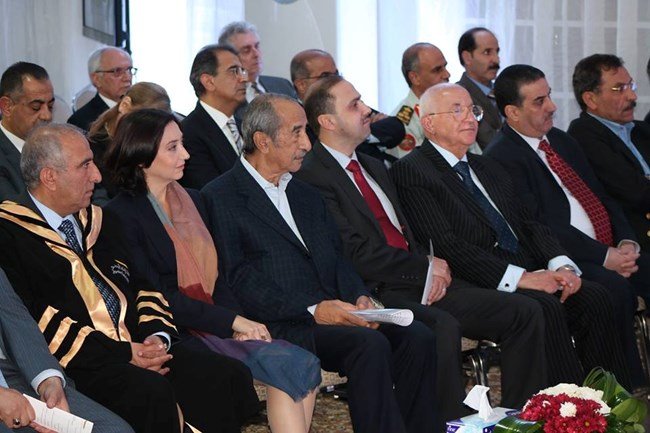Image:

09 Oct 2013
Arab media personality, Hamdy Kandil, yesterday evening called on journalists not to turn their backs on their profession, and become political preachers. He called on them not to join political parties and groups in order to maintain their independence, and integrity.<br />
<br />
In a speech he delivered during the graduation ceremony of the MA students of Journalism and New Media at the Jordan Media Institute held under the patronage of Her Royal Highness Princess Rym Ali, Kandil said that the first mission of any pioneer was to instigate change and reform, and reiterated the importance of fighting corruption and resisting oppression.<br />
<br />
In a ceremony that was attended by academic, media and diplomatic personalities, Kandil urged the graduates to uphold the media’s independence, freedom and the right of access to information. He also stressed the importance of accuracy and attention to detail, and in differentiating between media and advertising; highlighting the importance of respecting religious beliefs, social values, national identity and of spreading knowledge and avoiding sensationalism, sex and scandal.<br />
<br />
Kandil called on journalists to understand the motives of those who oppose their views, and then to stand up to them with integrity and professional criticism. He added that journalists should always strive to report on their topics with honesty, and to do that, they needed to be honest with themselves.<br />
<br />
Dr. Basim Tweissi, the Acting Dean of the Jordan Media Institute, said “ the institute believes in excellence, and calls for ridding Arab media of pontification and political rhetoric, and replacing it with a media that adheres to professional values based on facts and accountability.” He added that journalists who do not learn their profession in competent academic institutions, learn it at the expense of the public and the society.<br />
<br />
Tweissi said that the changes witnessed in the Arab world during the past three years showed how many media outlets veered towards one side of the conflict or the other, instead of guarding the truth. He said that this exposed a huge gap between what was expected of Arab media, and its actual performance, noting: “we drowned in an inch of media freedom.” Dr. Tweissi considered that the real dilemma of media outlets was in how they changed from being tools in the hands of the public during an era of change, to becoming tools for the management of conflict between centres of power. He elaborated that some outlets became pulpits for spreading hate, polarization and division, when they were supposed to be beacons of freedom and debate.<br />
<br />
The valedictorian, Aya Alayan, said that she and her fellow graduates sought to distinguish themselves, and thanked Her Royal Highness Princess Rym Ali for her continuous support of the students and graduates. Aya also thanked the donors for their generous support which she said was one of the reasons behind the success of institute’s educational mission.<br />
<br />
At the end of the ceremony which was presented by Anoud Alzu’bi, Master of Ceremony, Her Royal Highness handed out the graduates’ certificates in the presence of Dr. Khleif Tarawneh, President of the University of Jordan.<br />
<br />
The twenty graduating students had completed a one year intensive, academic programme spending most of their time in field work, and the production of news reports and scientific research in print, digital media, radio and television. During this time, the students demonstrated high standards of professionalism.<br />
<br />
In the course of its educational journey, the Jordan Media Institute was able to furnish major Arab and international news networks with exceptional journalists. The institute has successfully organized internships for some of its graduates in leading media organizations based in the United States, Germany, Turkey, the UAE and elsewhere.<br />
Throughout the academic year, the Jordan Media Institute hosted distinguished personalities in different areas of specialization such as Dr. Hans Blix, former Swedish Minister of Foreign Affairs, renowned CNN journalist, Jim Clancy and others. This enabled the students to engage in open debates, sharpening their critical thinking. The institute also organized cultural exchange visits for its students, the last of which was to Norway, courtesy of the Norwegian Institute of Journalism.<br />
<br />
The Masters’ programme in Journalism and New Media is at the core of the institute’s work, and the degree is granted in collaboration with the University of Jordan on the basis of an academic partnership agreement between the two institutions. The one year MA programme concentrates on practical journalism without compromising the essential theoretical content.<br />



